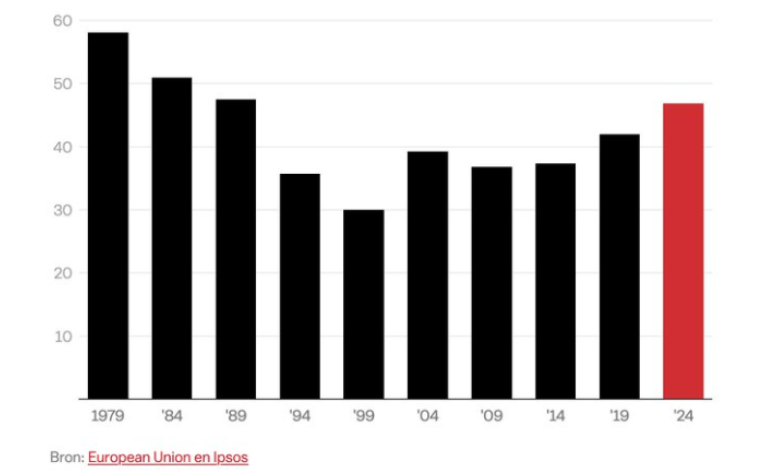Dutch 'Green-Left' victory shows high turnout matters in far-right fight
The Dutch left-green merger party led by former EU commissioner Frans Timmermans won the Dutch European Parliament elections, narrowly defeating far-right leader Geert Wilders for the top spot, gaining eight seats compared to Wilders’ seven, according to the definitive exit poll.
Earlier this week, Wilders’ Party for Freedom (PVV) was projected to beat all opposition, coming in with nine MEps. So it's no wonder Thursday's initial outcome was hailed by other leftwing leaders in Europe as a major victory.
“The message to Europe and to the far-right is loud and clear! We are ready to build a new course to protect our progressive values,” said Iraxte García Pérez, president of the Socialists and Democrats (S&D).
But with the Netherlands not being the largest of countries — filling only 31 seats in an EU Parliament of 720— the question of significance immediately came up on social media. Dutch political science professor Tom van der Meer, for example, criticised the media's “eternal fascination” with “who was the biggest.”
Cas Mudde, a Dutch politics professor at the University of Georgia, quickly pointed out that while significant, its importance may lie in its effect on the national political dynamic. “It will make it harder for the incoming coalition to argue that the Netherlands is eurosceptic,” he said on X.
Whether Timmermans' GroenLinks-PvdA, as the party is called in full, will indeed become the largest Dutch party in the European elections will only definitively become clear on Sunday evening.
So far, the polling – which has a margin of error of one seat – suggests that the gap between the parties is significant, with the green-left gaining 21.6 percent of the votes, while the PVV received 17.7 percent.
“It’s a marvellous result,” said Wilders on Thursday evening.
While the question of who was biggest may be mostly symbolic, the exit polls did show that high voter turnout in the Dutch elections was crucial in determining the outcome.
Although Wilders won seven seats, a major victory, his party significantly underperformed compared to the Dutch elections back in November, when the PVV won 23.5 percent of the vote.
According to these same figures, the three new governing coalition partners in The Hague, which also include the NSC and the Farmers Party, have also lost a significant voter share, from 56 percent last year to 38 percent today.
This has led some to wonder whether Wilders’ victory was actually a shellacking in disguise – if not for the PVV directly, then at least for his potential cabinet.
Looking more closely at the percentages, the newly formed NSC party, led by Pieter Omtzigt, has especially suffered.
They got 12.9 percent of the votes in the November elections, but now they’re down to just 3.8 percent. This fall in support was expected as the party, largely consisting of political newcomers, has struggled to maintain cohesion.
But it is also seen as a sign of the distaste within the party and among NSC members about governing with Wilders, whose Islamophobic rants are well documented and even led to a conviction for ‘group insult’ by the Dutch Supreme Court in 2021.
However, a better explanation for Wilders's failure to beat the Green Left seems to be more mundane and related to voter turnout. Compared to last year, 56 percent of erstwhile PVV voters stayed home for these elections, compared to 22 percent for the Green Left.

This is remarkable because overall, the Dutch voter turnout on Wednesday was the highest since 1989 (although compared to national elections still some 30 per cent lower).
According to the Ipsos pollster, the top reasons for those not turning out to vote were, "no interest in EU politics", "no trust in EU politics" and "generally uninterested in politics."
It turns out that mobilising the anti-EU vote is harder during EU elections. The question remains whether Wednesday’s results constitute a far-right victory.
It is clear that the fear of a far-right avalanche has not materialised. While the PVV did gain seven seats, the extreme right FvD lost all four, meaning that the anti-EU right gained three seats overall. This may not be enough to justify the 'far-right surge' label that many media outlets have used.
Before the week is over another seven seats will be distributed among the parties according to share. This means that some parties, like the FvD, whose leader Thierry Baudet has recently found success selling boxed meals on TikTok, may yet gain a seat.
It could also mean very small differences may lead to significant changes in the final outcome come Sunday. According to calculations made by another Dutch poller, the difference between the Green-Left and PVV could increase to three seats if the latter receives just 0.15 percent less than exit polls suggest.
Author Bio
Wester is a journalist from the Netherlands with a focus on the green economy. He joined EUobserver in September 2021. Previously he was editor-in-chief of Vice, Motherboard, a science-based website, and climate economy journalist for The Correspondent.
Tags
Author Bio
Wester is a journalist from the Netherlands with a focus on the green economy. He joined EUobserver in September 2021. Previously he was editor-in-chief of Vice, Motherboard, a science-based website, and climate economy journalist for The Correspondent.